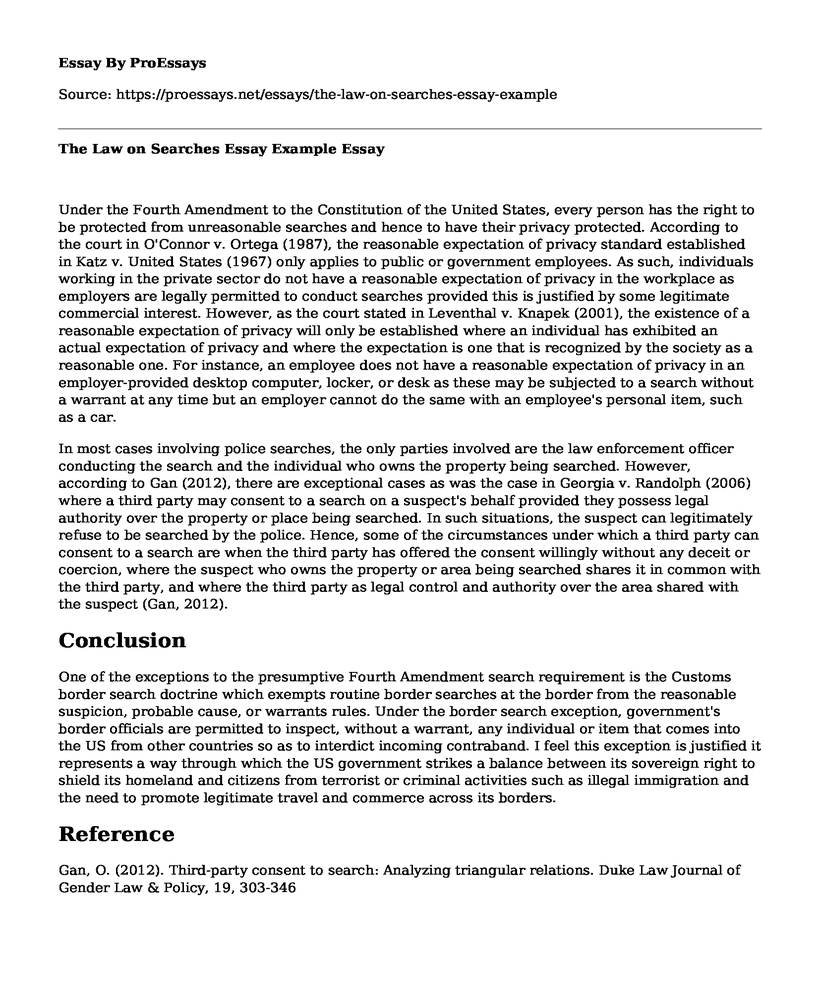Under the Fourth Amendment to the Constitution of the United States, every person has the right to be protected from unreasonable searches and hence to have their privacy protected. According to the court in O'Connor v. Ortega (1987), the reasonable expectation of privacy standard established in Katz v. United States (1967) only applies to public or government employees. As such, individuals working in the private sector do not have a reasonable expectation of privacy in the workplace as employers are legally permitted to conduct searches provided this is justified by some legitimate commercial interest. However, as the court stated in Leventhal v. Knapek (2001), the existence of a reasonable expectation of privacy will only be established where an individual has exhibited an actual expectation of privacy and where the expectation is one that is recognized by the society as a reasonable one. For instance, an employee does not have a reasonable expectation of privacy in an employer-provided desktop computer, locker, or desk as these may be subjected to a search without a warrant at any time but an employer cannot do the same with an employee's personal item, such as a car.
In most cases involving police searches, the only parties involved are the law enforcement officer conducting the search and the individual who owns the property being searched. However, according to Gan (2012), there are exceptional cases as was the case in Georgia v. Randolph (2006) where a third party may consent to a search on a suspect's behalf provided they possess legal authority over the property or place being searched. In such situations, the suspect can legitimately refuse to be searched by the police. Hence, some of the circumstances under which a third party can consent to a search are when the third party has offered the consent willingly without any deceit or coercion, where the suspect who owns the property or area being searched shares it in common with the third party, and where the third party as legal control and authority over the area shared with the suspect (Gan, 2012).
Conclusion
One of the exceptions to the presumptive Fourth Amendment search requirement is the Customs border search doctrine which exempts routine border searches at the border from the reasonable suspicion, probable cause, or warrants rules. Under the border search exception, government's border officials are permitted to inspect, without a warrant, any individual or item that comes into the US from other countries so as to interdict incoming contraband. I feel this exception is justified it represents a way through which the US government strikes a balance between its sovereign right to shield its homeland and citizens from terrorist or criminal activities such as illegal immigration and the need to promote legitimate travel and commerce across its borders.
Reference
Gan, O. (2012). Third-party consent to search: Analyzing triangular relations. Duke Law Journal of Gender Law & Policy, 19, 303-346
Cite this page
The Law on Searches Essay Example. (2022, Aug 15). Retrieved from https://proessays.net/essays/the-law-on-searches-essay-example
If you are the original author of this essay and no longer wish to have it published on the ProEssays website, please click below to request its removal:
- Charles Manson's Personality Based on Sigmund Freud and Karen Horney's Theories
- Essay Sample on Marijuana Legalization in the US
- Organized Crime in Canada - Essay Sample
- Essay Example on Crime: A Social Scourge That Needs to Be Addressed
- Gun Ownership & Gun Control in US: Assessing the Impact - Essay Sample
- Human or Civil Rights: Relevant & Contemporary - Essay Sample
- Annotated Bibloography Example: Comparative Analysis of Juvenile Justice and Mood Disorders







